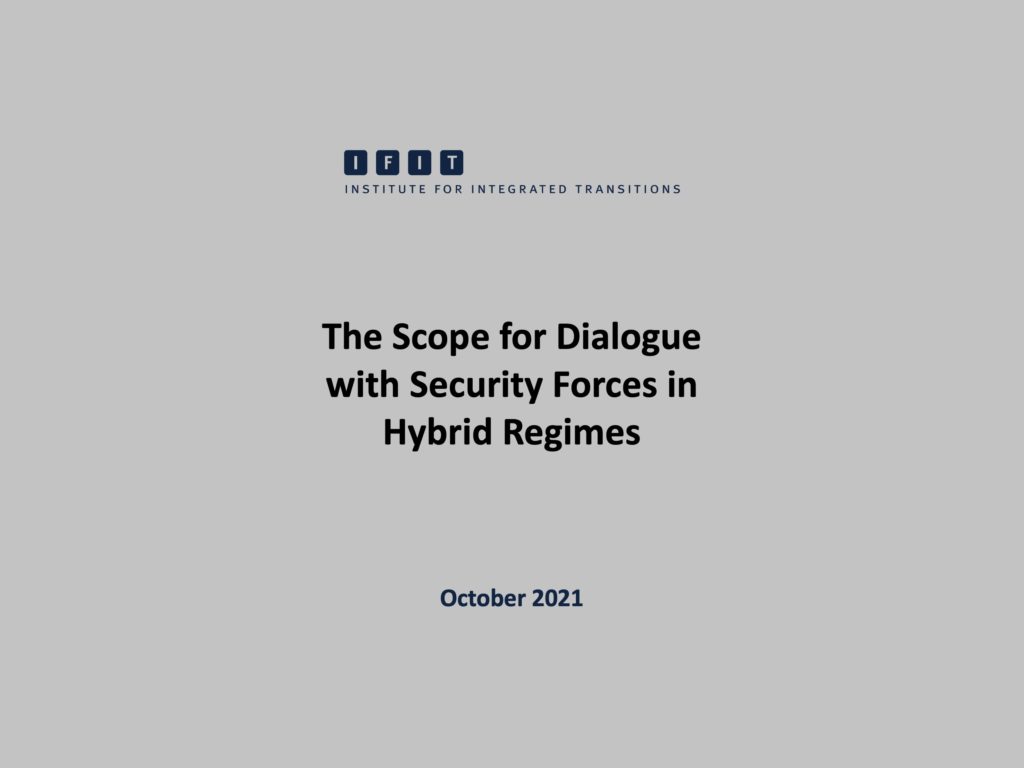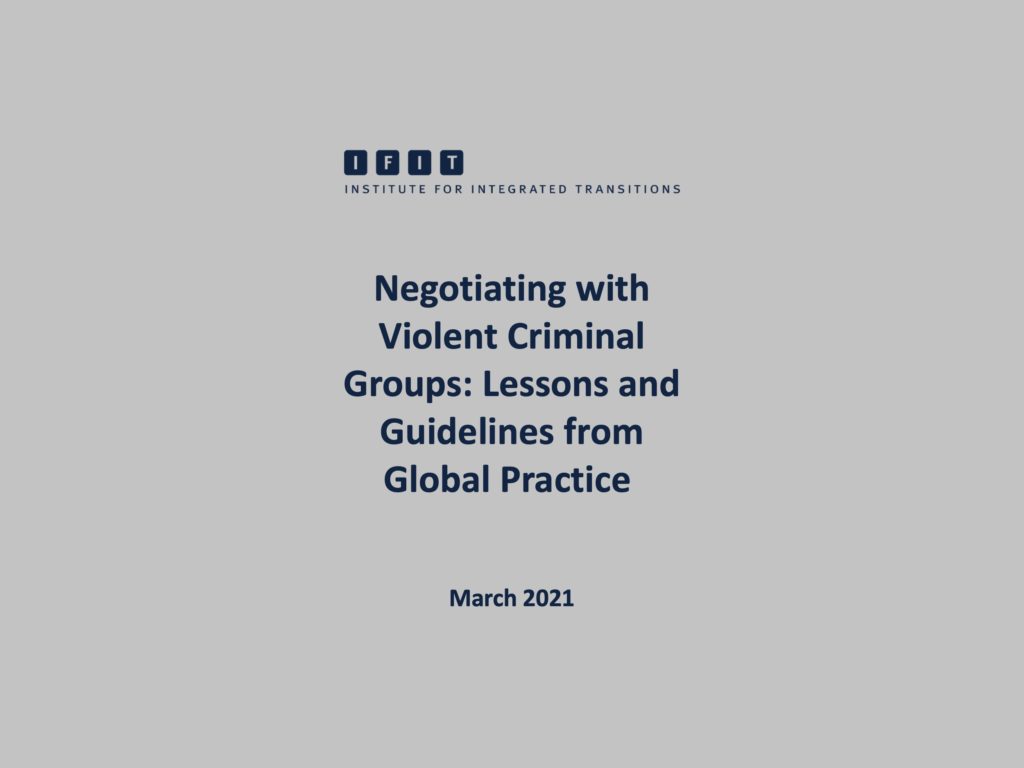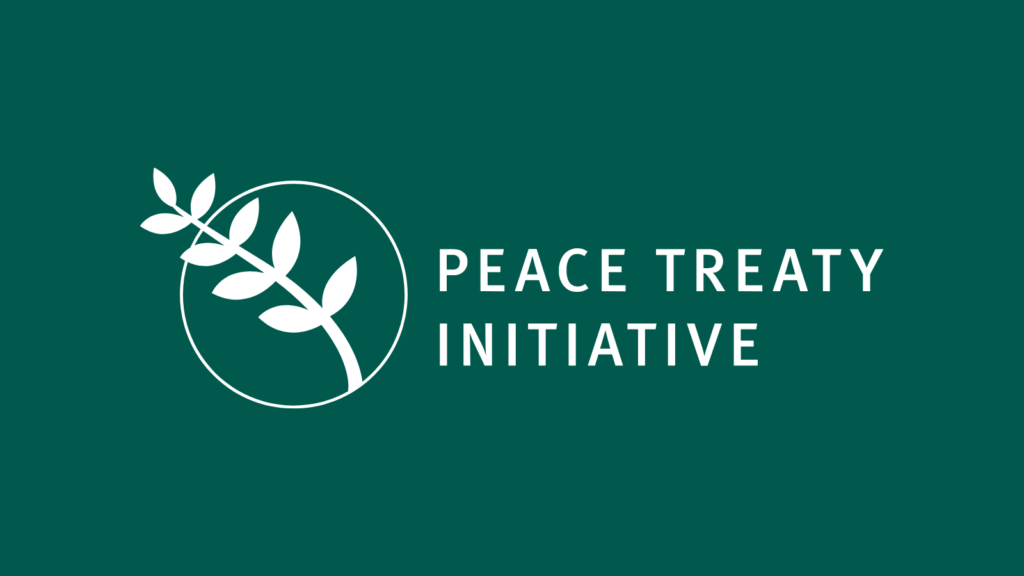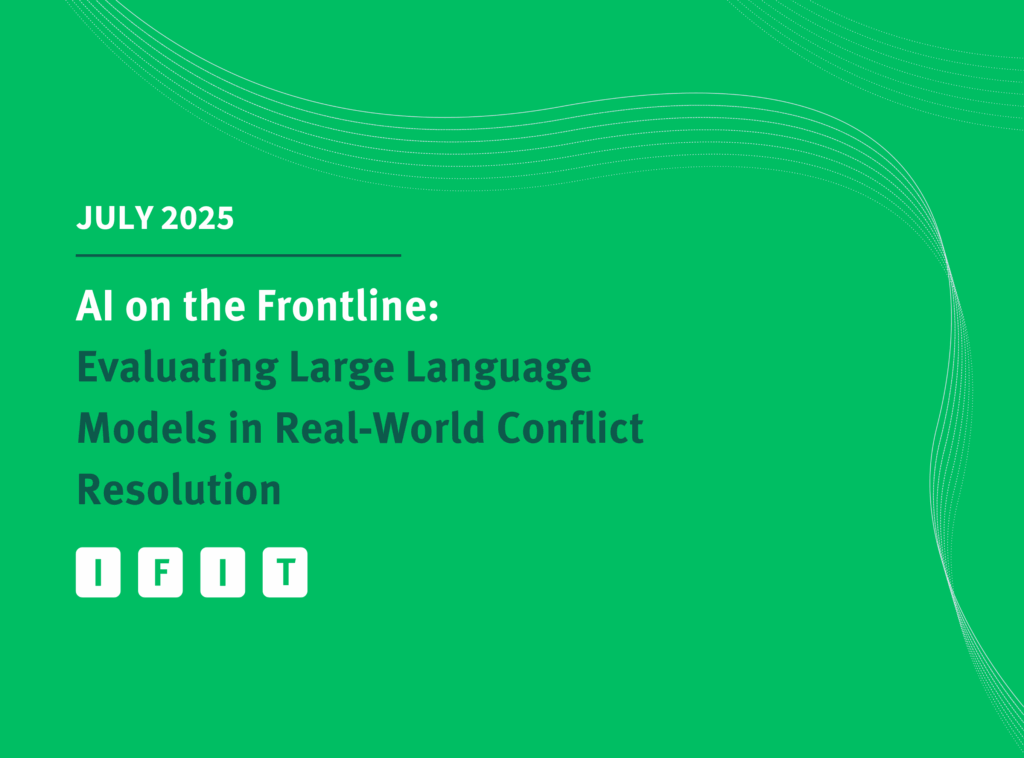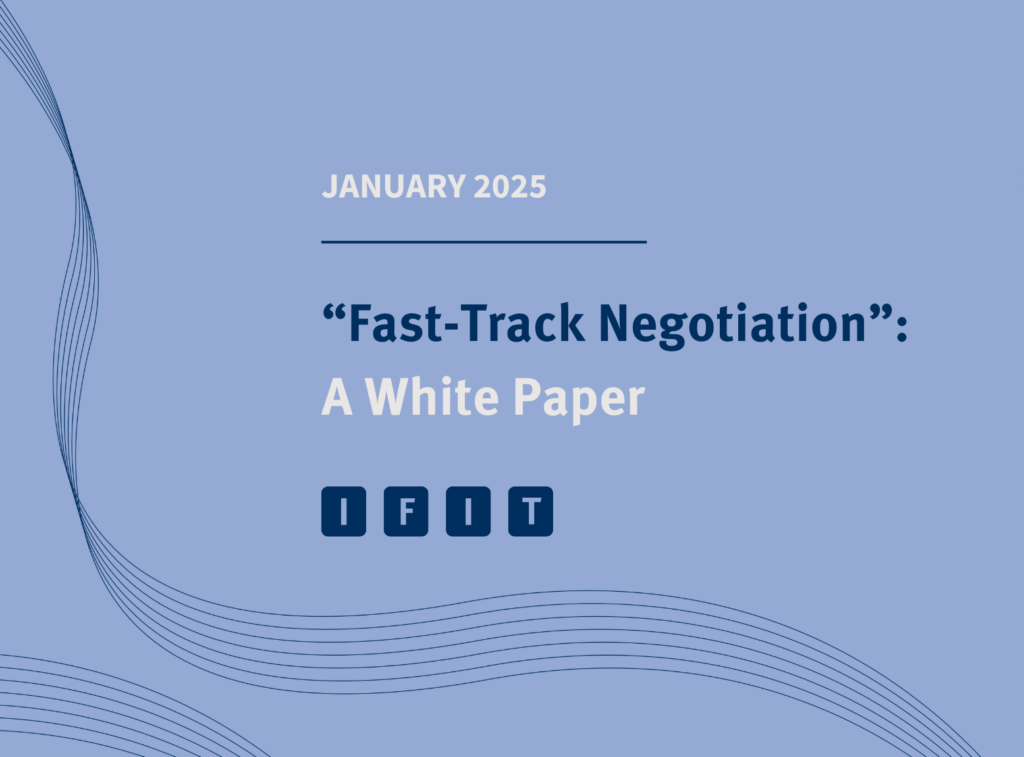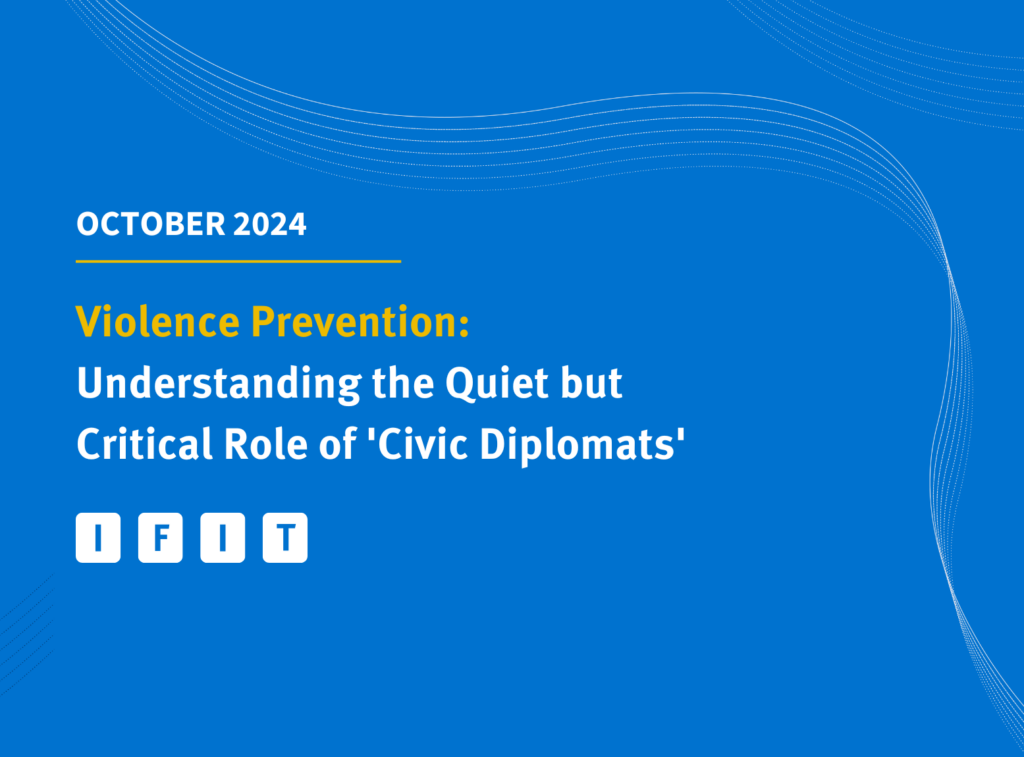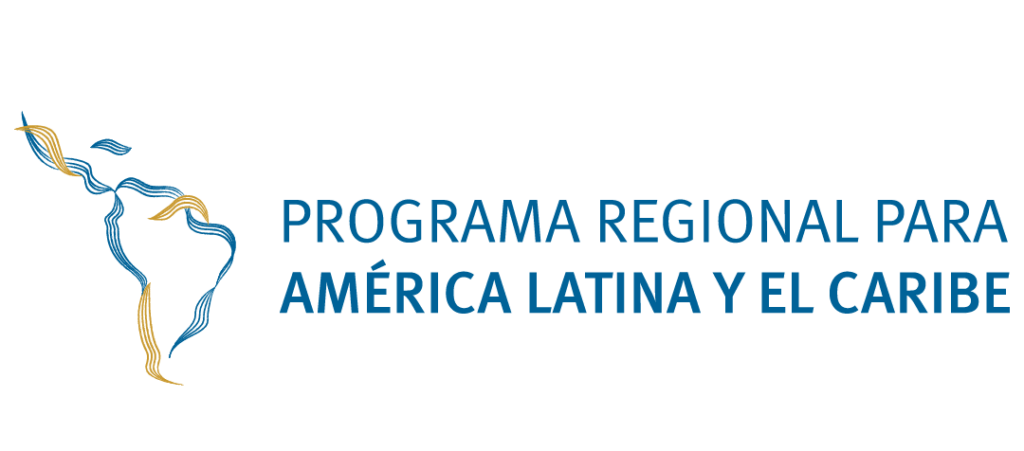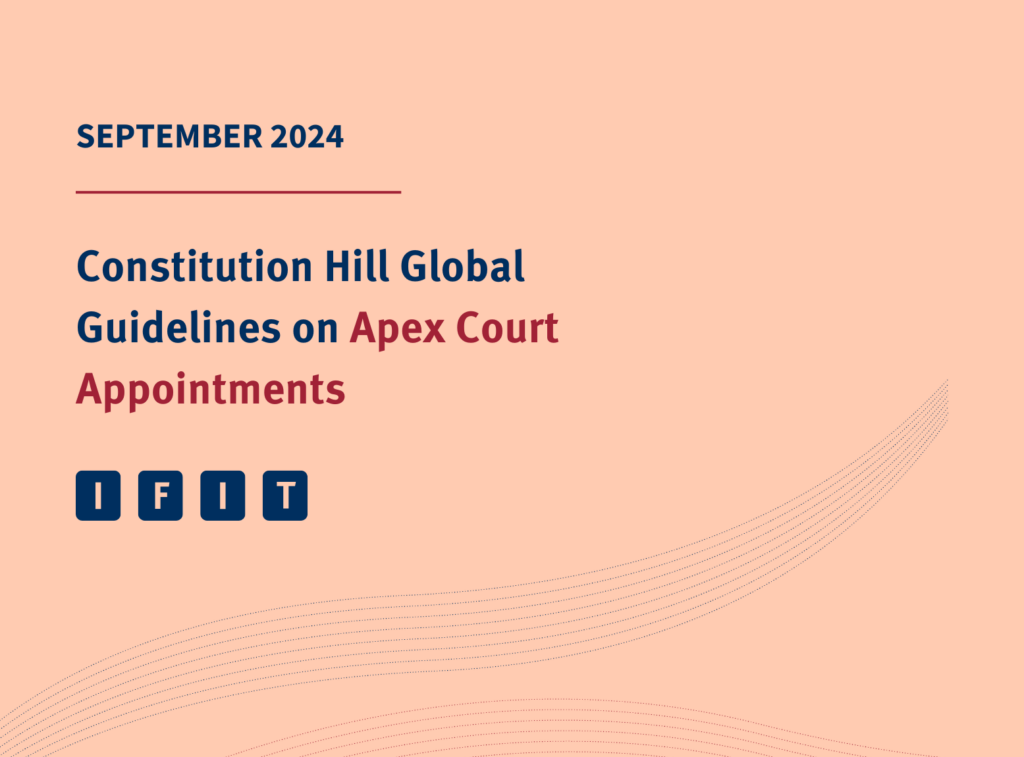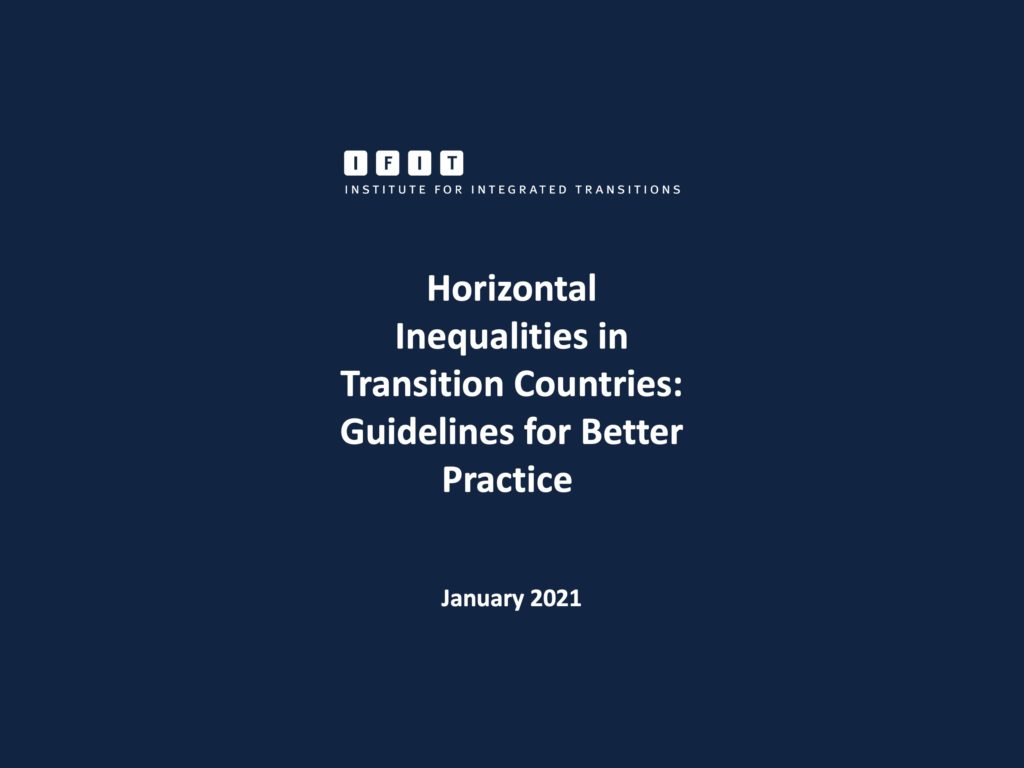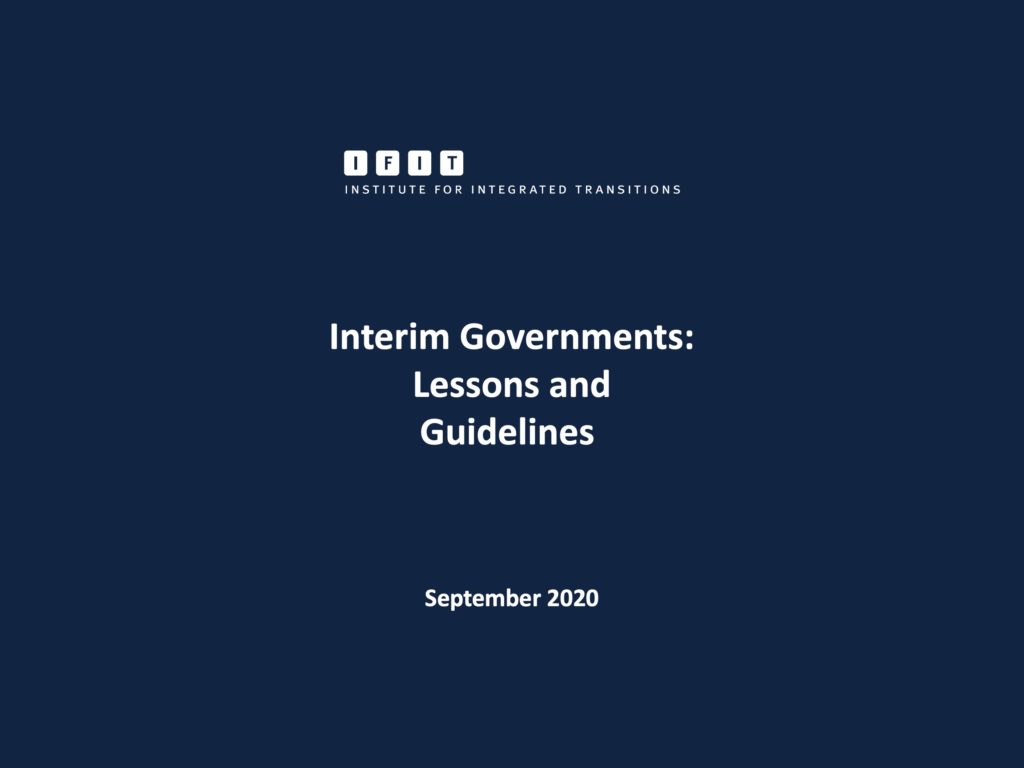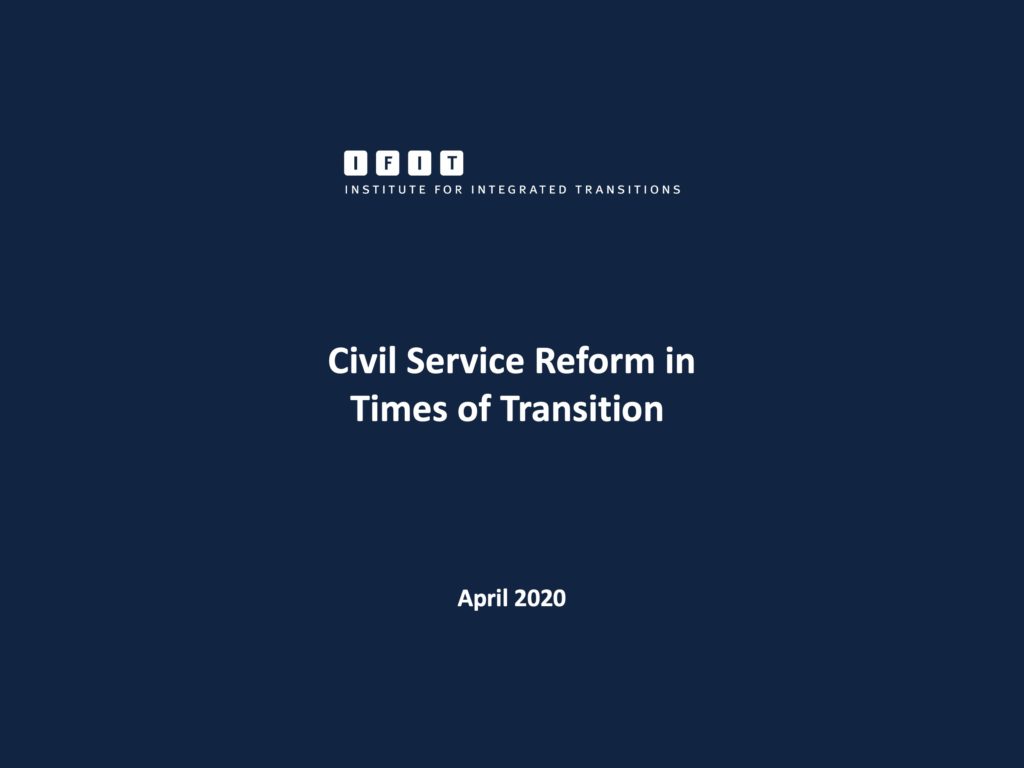This interview with Mark Freeman, IFIT Founder and Executive Director, and Professor Mark Drumbl, Director of the Transnational Law Institute, was conducted by Thierry Cruvellier and published in February 2025 by JusticeInfo.net.
Beyond the US sanctions, what led to the possible demise of the International Criminal Court (ICC)? Was the model and the supremacy of criminal law just misled from the start? And if the ICC falls off the cliff, what’s next? What’s the place and future of international law? Two-long time practitioners and researchers Mark Freeman and Mark Drumbl are grappling head-on with these burning questions.
What is your general analysis of the world dynamics of international justice today in the context that we see developing, and unraveling?
MARK FREEMAN: You kind of gave the answer when you said “unraveling”. I think all three of us have watched different chapters of the story of international justice. The modern onset arguably began with the establishment of the Tribunal for the former Yugoslavia, 32 years ago. Since then, we’ve seen multiple chapters, some good and some bad. The “behemoth” in the middle of the story, the kind of maximalist expression of the biggest aspirations of international justice, is the Rome Statute and the creation of this permanent International Criminal Court (ICC) – which was meant to be a court of last resort. The ICC is its own story in a sense, and I don’t think it has reflected the best of what we’ve seen across these different chapters of international justice.
MARK DRUMBL: If you want to unravel something, it has to have been raveled. So, what did we have before? I think what we had – in particular, the ascent of the International Criminal Court – is a system of international justice that was tinged with some politics, as inevitably is the case, and was rooted in some kind of a victor’s justice. We have this idea of the ICC as this bastion of universalism, permanence, a utopic form of idealism, of justice. And I think what we really are seeing with the ICC – and it’s taking up so much of the oxygen in the room – is some pursuit of perfection that actually has come at the price of just securing the good. I mean that with the permanence of the ICC, there is this notion that it can deal with all violences everywhere, in the absence of really digging into local, historical, cultural particularities, this idea of some self-evident nature of law as beyond politics. And in some ways, we’ve seen a regress in the palatability of international justice to a lot of audiences. Not just in powerful places. Also in powerless places where the vision of justice, as propounded by the ICC, doesn’t fully resonate with local expectations, wants, or desires. And I think everyone is aware that to some extent the ICC is a bit of a flailing institution.
Ironically, if you analyzed it from a business perspective, its expenditures are stratospherically higher than any kind of return on investment. But let’s put that to the side. One area where I think the court has issued some deliverables is in the areas of rebel leaders in weak states who fail in their rebellions. Governments of those states – who often themselves are not exactly aligned with the highest order in human rights principles – self-referred that violence to the ICC. In prosecuting unsuccessful rebel leaders through self-referrals, the ICC has actually delivered some modicum of convictions and outputs, and along the way has expressively developed international criminal law a bit, for example, on child soldiers and intentional destruction of cultural property. But what if you go full circle? That is not all that much different than victor’s justice that was so derided so long ago. Because essentially these self-referrals are victor’s justice.
So, what is unraveling is not necessarily a structure, but perhaps an aspiration, some genre of a project. And perhaps the pursuit of this project, in some ways, became the enemy of what was just good, or alright, or half decent.
You mean that the recent moves by the prosecutor of the ICC of going after top leaders was too much of a challenge to the idea of victor’s justice, and that couldn’t exist?
Mark Drumbl: No, I think it’s all fine and well to have aspirations to transcend the supposed politicization of law to some neutrality and supremacy of law. But I’m also not certain that the best place to do that is through the choice of arrest warrants in cases that ultimately just lead into dead ends. The non-dead ends of the ICC have been traditional victor’s justice cases, these self-referrals.
So, what’s the role of a court? Is it to make policy? Is it to advance ideals? Or is it actually to enforce law in areas where enforcement is plausible? It’s not only these heads of states that are eluding punishment. I really think we need to deal assertively with perceptions among victimized populations that the ICC has spoken so much about all of its abilities, but has delivered very little – and there’s a great pain. There’s a great pain to disappointment, and there’s a lot of disappointment that’s out there among victim constituencies.
Mark Freeman: The ICC was conceived as a utopian project, but there is, and was, a very important principle that I think could have offered, had it been implemented to the full, a different fate for the ICC than the one that we are witnessing now, which may be the slow-motion death of this institution. That principle is complementarity. The logic of complementarity is a logic whereby the court, the whole enterprise, is all meant to be a last recourse. The first recourse, according to the principle of complementarity, is for international crimes to be tried domestically. And had that principle been consistently and aggressively pursued, advocated, and implemented by this huge institution – in other words, had it been the ICC’s focus to train, support, empower the domestic authorities with responsibility to try international crimes – I think we could have found ourselves at a quite different moment in the story of international justice.
You’re referring to the “slow motion death of the ICC”. A number of observers are now openly talking about the possibility that this institution might just cease to exist. Is it obvious to you that it has to happen?
Mark Freeman: I do think it’s a story of death that we are watching, a death in slow motion, which may become fast motion soon. But some would say – to use Gabriel Garcia Marquez’s famous book’s title, “Chronicle of a Death Foretold” – that the seeds of this institution’s death were baked into the mandate. It was always going to be struggling very significantly in the realm of politics and diplomacy. It wouldn’t be allowed to just be a court of law because of the structural connection that was in-built between the Court and the UN Security Council on the one hand, and because of the lack of powers of arrest and the absence of many great powers as States parties on the other. Then you add to that a key early event: even before the court began its first day of work in 2002, 9/11 took place.
Some could use a different metaphor, the idea of a “dead man walking”. The ICC may have been a dead man walking all this time. Because there have been and always were going to be powerful enemies of this court. We could see this going back to the negotiation of the Rome statute in the 1990s. This was not going to be an easy child to keep alive and watch through adolescence and into full adulthood.
But through its underperformance, through a series of dramatically bad choices, under-attention to the politics, to the diplomatic role that it has to take as seriously as its legal role, I do think that, notwithstanding that this death may occur largely through murder, if you like, by the enemies of the court on the outside, the ICC has done things that make it easier for the court’s enemies. I mean, if the court died tomorrow, if it had to close its doors, I don’t think that the story would last more than 48 hours in the headlines. So those are different aspects of how I would see the death story. But I do think that it is what we are watching right now.
Mark, is that what we’re watching right now?
Mark Drumbl: Well, death metaphors are always very, very compelling both in art and literature. I mean, just listening to Mark, I’m reminded of Dylan Thomas – “rage, rage against the dying of the light”. This is the efforts of institutions or human beings to resist, reject, thwart, parry death in some form or another. If institutions are organisms with instincts, then what we’re seeing is the very natural push to remain in business and to remain relevant, to be thought of and valued. I think we see this in the context of the International Criminal Court indicting powerful leaders that they know they will never, ever get into custody. And we see this in its pursuit of a set of very problematic phenomena, such as, for example, gender apartheid in Afghanistan.
It is a very live question whether the penal prosecution of a small number of leaders is the best way to secure human rights in Afghanistan – and of course this is deeply selective in that British and US involvement has simply not morphed into any kind of concrete prosecution. So, we always have this Achilles heel of selectivity.
It’s interesting to talk about the ICC. But talking about the ICC reminds me of this American colloquialism of “shooting fish in the barrel”. Because it’s quite easy, you know, to look at this bloviated and bloated institution that’s blundering, and wonder why it happened, and have prognostications of death and rage, rage against the dying of the light.
To me, the more interesting question isn’t per se the future of institutional international criminal law, for example, in the form of the ICC. The really interesting question is its future as a regulatory mechanism, to deal with busts of the global trust and to deal with attending to what we foresee as our most pivotal security, sovereignty, human rights, and solidarity concerns. What I see, looking ahead, is a set of violences that a future generation is going to have to deal with that don’t much look like the malevolent intentional infliction of harm that the penal law normally addresses. What future generations are going to need to deal with are structural harms of environmental change, climate change, public health catastrophes – you know, the pandemics, global capitalist flows, embedded poverty. These are the kinds of things that I see as hitting tipping points where they are going to become major independent variables affecting human rights, sovereignty, stability and security. And those are not the kinds of violences that international criminal law can deal with.
We may be dealing with two things at the same time – the kind of violence that you are describing and the old-style violence of wars and military invasions. This still looks pretty alive and kicking. But let me go back to the ICC: do you consider the US sanctions as the last decisive factor that brings it to a brutal death?
Mark Drumbl: The US relationships with the International Criminal Court are like a cosine wave. Let’s not forget that there used to be a thing, The Hague Invasion Act, that was passed way back under a previous US administration. So, this kind of rhetoric by Congress and the United States is something that has been a perennial sidekick to the ICC. I’m not certain whether the current state of United States sanctions is enough to lead to a death of an institution.
I think in some ways the demise of the institution was largely foretold, because other than in a very small number of self-interested quarters, the ICC never built up affection, faith, trust, warmth. I mean that there’s an enormous distance between the work of the ICC and the emotions of those individuals that it was supposed to uplift.
I’m Canadian, I teach in the United States. When I first started becoming a law professor, there were a lot of young people who were really keen on this idea of international criminal law as some kind of project of global redemption. And the ICC was the entity by which to achieve this. I don’t see that anymore in younger generations. I see concerns over human rights at the domestic level, and then I see huge concerns over the kinds of structural violences that don’t get called violence that I mentioned earlier, and I’m sorry but a criminal court just cannot deal with those.
I think we’re still rooted in the traditional context of prosecuting really unappealing, malevolent, individuated human rights abusers that are easy to blame, easy to castigate, easy to scapegoat. And I think that just masks the structural embeddedness of violence, including violence that is going to really affect us, that is committed in many ways by people who don’t actually want to hurt anyone. What do we do about that? I don’t think a criminal court is the answer to that.
Mark Freeman: I agree with both of you that we probably are seeing both kinds of violence. But you’re wondering if these sanctions are sort of the final push, like if you’re standing at the edge of a cliff already, in part because you’ve been pushed there, and in part because of your own actions. Yes, that’s possible. It’s possible that this is the moment where the ICC gets pushed off a cliff and can’t climb back up. It takes a hard fall and that’s the end of the story.
And if that happens, then we have to be thinking about what comes next. We will need to do a proper review of what went wrong, and maybe what needs to change in terms of dealing with radical forms of impunity, of whichever variety.
Still, in thinking about acts of self-sabotage, looking back only a few months ago, the case involving Israel/Palestine comes to mind. I mean, the ICC arrest warrants came out just weeks after Donald Trump was elected as President of the United States. And there’s no indication at all that the court even attempted to apply the principle of complementarity, and as Mark just said, they didn’t build constituencies, they didn’t build affection, and so they end up making it easier for adversaries, enemies and spoilers.
So if this US bill is the nail in the coffin, we’re going to have to do a serious autopsy, and maybe return to the unfulfilled promise of the idea of complementarity – going back to what Mark said about a much more localized approach to justice, as opposed to this distant, from afar, virtually desk-based justice.
Mark Drumbl: I think this conversation on complementarity does open up an interesting door. Perhaps we can slip for 30 seconds into what I see as a slightly more optimistic assessment of something that happened over 23 years of the ICC. We might want to think about the entire preliminary examination approach. There is something to be said of a positive role that it triggered, for instance, in Colombia. It is perhaps one area where there has been some results. This preliminary examination might be something of greater positivity. Another greater positivity is something that I mentioned earlier, which is, if you believe that international criminal law should continue to grow and expand and accrete and cover more and more stuff, and you really believe that retributive enforcement of penal law and carceral justice can promote human rights, then there could be something to be said of examining the ICC’s expressive role in expanding international criminal law and broader human rights, including gender equality and so forth.
But fundamentally, what I think is wrong with the ICC is not the ICC. The question should be, what is wrong with us? The ICC is a product of certain us’s, and every institution we build internationally, every project of global redemption, every philosophical vision that international criminal law will save us from ourselves, those are all products of us. We created it. It is what was possible to create. And we also need to recognize that in the flailings and flounderings of the ICC is simply a representation of the fact that the us and our us’s did not want to do anything different or better or more effective, because maybe we are just not yet there. That’s also why we don’t want to talk about climate change systematically; we’re not ready to make those sacrifices.
Similarly, the ICC is as it is because it’s the most that could happen. It’s convenient, it’s easy. It prosecuted a small number of weaklings, tried to develop braggadocio in prosecuting bigger fish that it could never catch. Fine.
We can talk about the US and its sanctions. But African states and continental European states have also not been particularly supportive: we don’t need to rehash things about arrest warrants that are unenforced, all these conversations now in France, in Italy about immunities and not enforcing stuff. It’s not just the US. The US is a bogeyman. I think that there is a lot of reticence out there, and I don’t necessarily think this ought to be defined as ICC opposition as much as a reflection about what we collectively want.
There’s another way to look at the demise of the institution, by saying that this court could only be a mirror of the world order. If this world order changes dramatically, and the rule of force is back and trumps the rule of law, there is no way the ICC could survive, even if it had been smart, productive, and showing results. These kind of institutions disappear, at least for a while, until a new world order is established. Do you see that too?
Mark Freeman: I hear what you’re saying, but I suppose part of me wants to resist the idea of some inevitability to what we’re seeing with the ICC. The institution itself has produced more cynicism than optimism. And it’s not just because of how few cases it has completed and so forth. It’s a detached institution from crime scenes. It’s a detached institution by and large from the politics on the ground that you need to face and confront if you’re going to deliver something good. It’s detached even from the opportunity built into its mandate through complementarity.
But let’s take your comment as a proposition that we’ve now entered into an era of might and force. I would agree that we’re exiting the era of the ascendancy of a liberal, rules-based order, and we’re entering into its opposite. So if the ICC is approaching its demise, we will need to come up with ideas for this new time. One part of which, yes, we can generate out of lessons from an autopsy. But another part involves facing the new global landscape, including what you’re saying, but also what Mark had talked about earlier, which is the broader forms that impunity takes. Doing that exercise, maybe, would allow for more constituency than we see for the ICC.
Do you feel like you are at a time in history where you have to change your “software” because the one that you’ve been using in the past three decades is largely obsolete? And if so, have you managed to have a new organizing principle in your own action and priorities?
Mark Freeman: The short answer – and here I would cite, among others, the work of Phil Clark, a friend and a colleague who wrote a book about the ICC called “Distant Justice” – is that what we need is a broader theory, which is that justice requires proximity, not distance. This is the kind of justice – proximate justice – that I would want to see going ahead in an era where maybe we won’t have as many global institutions and global forums to turn to, whether as a first resort or as a last resort as the ICC was meant to be.
Whether it’s with or without a treaty – because the Rome Statute presumably would die with the court – when I think about what comes next, it is very much around trying to place the highest premium on what can be done locally, where physical detachment, and therefore emotional detachment, isn’t an option. Justice should be proximate, justice should be seen to be done, and so it’s not going to look like what we see in The Hague, which on some days might resemble something more like a library or a laboratory rather than the messiness, but meaningfulness, of proximate justice. I think we have to invert the pyramid of justice, flip it on its head. That’s not much of a formula in practical terms, but at least it points to a direction of travel.
Mark Drumbl: I think it’s important to place the genesis of the International Criminal Court and other sort of cognate ad hoc institutions within their historical moment. I was a law student in the very early 1990s, I sort of came of age in this time and space, and the more I look back on that decade, the more I see it as aberrational. We seem to look at what happened then as some genre of norm. I actually think it was much more some sort of deviance, in a good way, but deviance from the norm. This was a period in which liberal institutional internationalism hit its apex in terms of popularity. It’s the decade in which I moved to the United States because American law schools were hiring international law people and wanted foreigners teaching here. In many ways, that was an unusual decade. So maybe what we’re seeing now is less a regress and more just a slip into the way things normally are, and normally have been. And instead of being so outraged over this shift, maybe we shouldn’t see it as a drift but as just some movement back to the norm.
I think international criminal justice has become a business rather than a passion and something in which one is emotionally invested. It’s trended towards the technocracy of best practices. It’s focused much more on human rights than actually on human beings. And I think that is something that explains a lot of what Mark was saying about this idea of distance, which I completely agree with.
One thing that we need to recognize is that the nation state, and local forms of governance, are really resilient. All of our talk of globality and cosmopolitanism and internationalism and supranationalism, and all of this ‘kumbayah’ across the world actually belies the reality that for the vast majority of people, nearly all of the time their principal emotional attachment is to the nation state, or to the nation state they want to create, or in fragmented nation states to local authorities and local entities. And outside of small slices of technocratic global elites, I don’t think transnationalism has shifted that level of allegiance, attachment, comfort and warmth. I mean, I even see it in the United States: There is zero conversation on either the right or the left in the United States right now about turning to supranationalism or internationalism as an alternate place in which to invest the emotional energy of governance or faith in governance.
In that sense I don’t think the ICC has done anything to cultivate an ethos of globality and internationalism as a place in which people really want to invest. You asked about the version 2.0 of all this? I have to be in agreement with a lot of what Mark says about the proximity of locality. I think one lesson learned is that it still is the most meaningful place for most people. We have to accept that, but we’re not ready to accept that, to be frank. One of the reasons that internationalism is so appealing to a small number of technocratic elites is because the content of internationalism is actually not all that international: It’s reflective of a certain vision of what human rights are, how human rights ought to be enforced, and what the good life is. And it’s a neo-capitalist, quasi-democratic vision of how the world ought to be ordered. And the point is, if we really want to get proximate, if we really believe in locality and decentralization and getting close to lives lived locally, we have to accept that a lot of people in a lot of places in the world are living lives that don’t look much like the normative content of what is being spread as international human rights law.
That’s the greatest danger in the complementarity proximity argument: if all that it does is import the substantive content of international criminal law, as some individuals have defined it, into diverse national orders, I don’t think it’s going to be met with a great deal of warmth, or affection, or salience, or resonance. I think one thing that ought to be done differently is for individuals to engage much more with comparative area studies, in an academic sense, rather than invest all their energies in the fine tooling and fine tuning of supposedly international norms. The last thing the world needs is another PhD dissertation on some minutiae in the Rome Statute. The things the world really needs are assessments of how local actors, acting locally in a diverse constellation of places, perceive and want to improve their lives and live the good life in the face of often cruel oppression. And I don’t see a lot of that bottom up kind of empowering work being done.
Once you fully acknowledged and realized this, has it pushed you to change your teaching?
The answer is actually yes. I teach much less law and much less international law, and much more in the way of life and social norms, in a diverse array of places, locally so. Yes, I think what I have shifted or diversified are the texts that are used in terms of how information is conveyed. Another thing that I have done is focus more on teaching of history in conversations about human rights.
One thing that was unfortunate that happened in the 1990s when a lot of these institutions were created, was this celebratory notion of this supposed “end of history”, you know, going back to [this American political scientist] Fukuyama. This notion that we have created a new tabula rasa, and it’s in this higher-level plane where all that is going to happen in the future: all is novel and isn’t rooted in historical antecedent other than some glancing reference to the Nuremberg tribunal.
What we also need to do is recognize that justice, fairness, equity, equality, empowerment, change, dignity, and respect do not only need to be conveyed through legal interventions. We’ve radically oversized the transformative power of law, because lawyers have been able to convert law into a business, and they’ve done quite well. But in the end, I think that the monopoly of law, or the monopoly that law seeks to exercise over the promotion of human rights, is another reason why we’re in the morass we’re in now. So, although I teach law, I’m trying to teach less law.
Mark, has there also been something in your practice that you have abandoned out of the realization that some of what you thought was irrelevant or wrong?
Mark Freeman: Because I arrived at international justice through the door of transitional justice, I was always quite skeptical of what criminal justice could achieve, because I saw it as one part of a larger package of things that would be needed. I was always thinking about non- judicial mechanisms, and wrote about that extensively in the early part of my career. I’ve always been skeptical, in particular, of international criminal justice in terms of the aspirations that are expressed through institutions like the Rome Statute and the ICC.
But my philosophy has always been to work with what you have in front of you. So 23 years ago, whatever skepticism I may have had then about the ICC as a project, you know, it was a reality. So let’s try and see if there’s ways to make this work. And that’s where I would say the phase of incremental disappointment began, because, I will say again, the real promise was in the principle of complementarity, which was the inversion and the reverse principle of the rule of the ad hoc tribunals in Yugoslavia and Rwanda, which had operated on the principle of primacy, meaning that the international could basically kick out the domestic.
So as I say, I am not surprised that we are where we are today with the ICC. And I think of this as a pre-mortem conversation.
You both referred to authors during our conversation – to Garcia Marquez and to Dylan Thomas. Is there an author or a book that you have recently gone back to, or discover, that has enlightened you, or helped you to better navigate this rapidly changing world?
Mark Drumbl: Recently, I reread Dante’s “The Divine Comedy”, and his journey from Inferno to Purgatorio, and then to Paradiso. I find in Dante a tremendous amount of insight into the beauty of human interaction. In particular, the relationship between Dante and Virgil. And this is this idea of the salience of human contact, the salience of accepting the other as they are, not always as they ought to be in your own vision, and the importance of back and forth. So, to me complementarity, if effective, I would call it conversationality. This is one thing that the turn to legalism and law as an invasive species, which it basically is, doesn’t do well in that there is some search for some universality, some all-encompassing principles that are, in some Hegelian sense, the best possible things, and then the application of those norms everywhere, universally and constantly.
We see this obviously in formal international law institutions and one area that I do have concern about is in the transitional justice sector. More generally, this takes the form of the emergence of regulatory best practices that become issued, and then the sine qua non of any kind of post-conflict reconstruction paradigm. This kind of stuff worries me because at the end of the day, what we have seen is that it’s much easier to develop affection for human rights and their simplicity than it is to develop understanding, empathy, and affection for human beings in all of their complexity. For years I’ve written about law’s great struggle in dealing with victims who victimize. When the hurt actually hurt other people doesn’t fit in law’s binaries. I think we see a lot of this binary thinking that becomes applied through law. In my view, it’s bedeviled a lot of work on reintegrating and rehabilitating former child soldiers. I think we see this in a lot of places.
I think we would do well nowadays to engage more with ethnographic methods, anthropological approaches that embrace the complexity of the human condition. I see that we have – and lawyers are part of this, and international human rights folks are part of this – this increasing dependence on these documents, these approaches, this almost religiosity. And whether it’s to spiritual documents or it’s to supposedly modernist human rights documents, we’re in a space where we just listen a lot less than we used to. The mentality of law, this notion that my system is the best self-evidently and ought to be applied everywhere, has led us into some of the problems that we are facing. And that would be the note on which I would end as opposed to the relationship between Dante and Virgil.
What about your book, Mark?
Mark Freeman: What I recently reread is “The Drowned and The Saved” by Primo Levi, a Holocaust survivor. There’s an essay in the book that talks about so-called “gray zones”. When he talks about gray zones, he’s trying to understand the people who are somewhere between good and evil, which is to say, most people. He was looking at it through the prism of the death camp where he himself was, and was trying to understand the role of Kapos.
I’m Jewish, and I’m trying to understand, with a lot of stress, I have to say, emotionally, the feral return of antisemitism, the so-called “world’s oldest hatred”. Every generation of Jews faces some version of this, and it’s just taken me aback. There was an antisemitism hiding in plain sight that somehow eluded my attention. So, I was hoping that Primo Levi could help me understand that, but also the idea of gray zones, which relates to the themes of this conversation.
In this essay about moral gray zones, Levi says that he, even as a person who survived the camps, didn’t dare pass moral judgment on some of the people who were playing these violent roles as Kapos.
I appreciate that kind of humility, when it comes to moral judgement. Treating complexity as the rule, not the exception. I would love to reimagine an international justice that is based on moral humility, as opposed to easy passing of judgment, the worst kinds of which are done at a distance.
Originally published in JusticeInfo.net.
You may also be interested in
